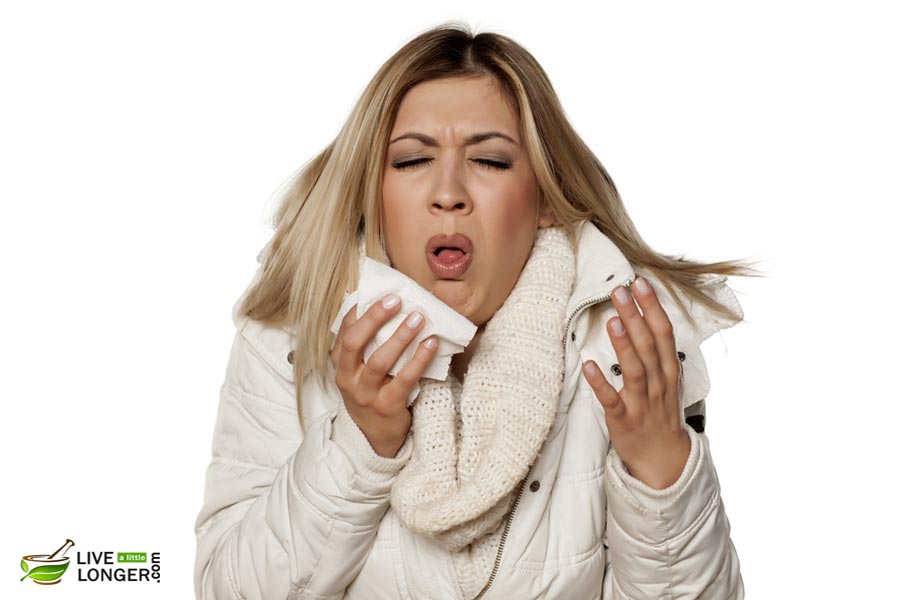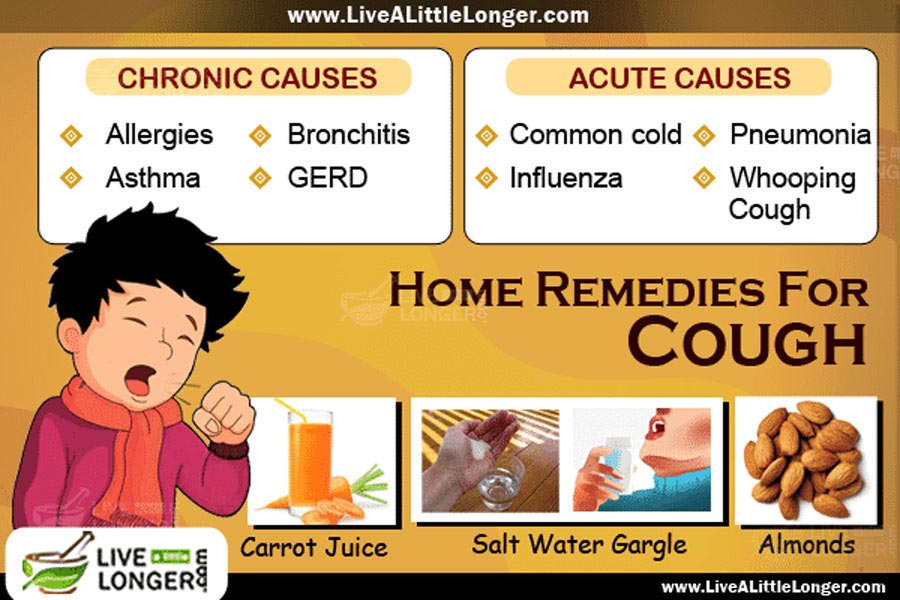Is your throat itchy? Is it getting worse with sore? Do you feel uncomfortable during inhalation and exhalation? If the answer to all these questions is “yes”, then you should take care of your gullet in the right direction to avoid further problems. Cough occurs when the body clears all the large secretions in the throat region. However, some other factors include:
- Irritants
- Microbes, and
- Foreign objects
Though it is good that your body is clearing all the phlegm and irritants from the throat, even a little of it can be very debilitating. Of course, you can take pills and syrups but are they necessary for a mere cough? Also, you cannot deny that they have a lot of side effects. But yes, there are simple home remedies to treat your cough.
Before we list them to you, let us learn more about this ailment and its occurrences in detail. In the cough reflex, there are different phases by which the air is thrown out as a reaction. It appears to happen in a phased manner; wherein the inhalation follows the forced exhalation pushing the air through the glottis. In this process, the violent and the forceful air comes out of the lungs, making a distinctive sound while opening the glottis.
By occurrence, coughing is both involuntary and voluntary. Some of the other causes that play a crucial role in developing the cough include:
- Common cold
- Smoking
- Viral infection
- Flu, and
- Health sicknesses like lung cancer, asthma, and tuberculosis
Causes Of Cough
The Causes of cough can be classified into two types:
- Chronic
- Acute
Let us look at them in detail.
A. Chronic Causes Of Cough
Here are the four chronic causes of cough:
1. Allergies
When your body’s protective shield immune system clashes with some foreign bodies like pet dander, bee venom or pollen, it may react in some or may not in others. This action of your body is the allergy, and this happens when your body (internally) encounters the outside materials.
2. Asthma (commonly found in children)
Here, your body produces mucus in the air passages. The airways are narrowed due to swelling of the mucous. By this problem, breathing becomes difficult and subsequently wheezing, and coughing is triggered while shortening the breath.
3. Bronchitis
The development of inflammation in the bronchial tube lining is the sole reason for the occurrence of bronchitis. While reacting to the ailment, the infected person often ends up in coughing with the thickened mucus. This can be discolored. This breathing problem occurs either in the acute or in the chronic form.
4. GERD (Gastroesophageal Reflux Disease)
GERD falls under the category of chronic digestive illness. Not regularly, but occasionally if the content of the stomach including acids is made to enter into the esophagus (food pipe), then GERD problem occurs. The irritation caused by the substance on the lining of the esophagus is a major reason for the GERD appearance.
B. Acute Causes Of Cough
Here are the four acute causes of cough:
1. Common Cold
The nose and the throat region are bound to be infected in the case of a common cold. Your upper respiratory tract comes under the attack due to viral infection. Usually, this problem is not considered serious, but if it is left untreated for a long time, it may turn into a big health problem. The person may counter a runny nose, sneezing, congestion, cough and sore throat in general, but it changes from one individual to another depending upon his/her physical activities and immune power.
2. Influenza (flu)
The respiratory system of the person comes under the direct attack of the virus. The stomach flu differs from influenza or commonly called as flu. Vomiting and diarrhea are the results of stomach flu.
3. Pneumonia
The inner burning of the air sacs in one or both the lungs develop due to an infection called Pneumonia. Reacting to this contagion, pus (purulent material) or fluid generates in the lungs, and this leads in causing the cough with pus or phlegm. And the appearance of chills, fever and breathing problems are the other illness factors that depend on the first problem.
4. Whooping Cough (Pertussis)
It is a highly infectious respiratory tract problem, where an individual ends up in having a high-pitched whoop cough. In this process, the air is inhaled and exhaled in a fast manner.
Types Of Coughs
Persistent/chronic coughs vary and you can see different types like:
Dry cough:It doesn’t produce any mucus but it will make your throat feel sharp irritations and even lungs will experience such condition too. It can be mainly due to viral infections/sinus problems.
Chronic Wet-Cough:IT produces mucus or sputum and occurs mainly due to bacterial infections and sometimes due to fluid in the lungs as a result of congestive-heart-failure (it depends upon the mucus color).
‘Barking’ Cough: It’s common among those suffering from severe cold or viral infections in the throat. It’s common among all age groups and the barking/heavy sound is due to the swollen-trachea (windpipe) due to infection.
Whooping Cough: It’s the cough accompanied by the whooping sound due to severe infection. You need to consult the doctor because the whooping cough (pertussis) condition is highly contagious towards respiratory aprts and even become deadly for babies less than 1.5 years of age.
Stress Cough:When you are under a lot of stress, the body causes reflexive spams in the airway/wind-pipe causing cough. It is not very serious and there’s no infection involved. It will not produce any mucus.
How To Get Rid Of Cough?
 Coughing makes an individual feel tired and weak because this activity requires a lot of energy. Moreover, his or her sleeping, socializing, interacting, and other activities are disrupted. Coughing brings many other problems as well. It is recommend you turn up the heating on your new boiler, as living in a cold house can lead to chesty coughs. These usually include chest pain, headaches, sweating, fractured ribs and poor bladder control. To help you relieve the discomfort, we have listed out the best remedies after a deep research.
Coughing makes an individual feel tired and weak because this activity requires a lot of energy. Moreover, his or her sleeping, socializing, interacting, and other activities are disrupted. Coughing brings many other problems as well. It is recommend you turn up the heating on your new boiler, as living in a cold house can lead to chesty coughs. These usually include chest pain, headaches, sweating, fractured ribs and poor bladder control. To help you relieve the discomfort, we have listed out the best remedies after a deep research.
10. Gargle Salt Water
So, we have heard this “salt water gargle” remedy plenty of times but does it work? Well, yes! A saline solution draws surplus fluid from the throat’s inflamed tissues. Also, gargling loosens the thick mucus and removes irritants like bacteria, fungi, and allergens from your throat. Follow the instructions given below:
- Step 1: Take one teaspoon of salt and 8 ounces of warm water. Stir them until they dissolve.
- Step 2: Gargle the mix for several seconds in a streak and spit the rinsed water.
- Step 3: Repeat the process and then rinse one more time with plain water.
How Does This Work?
There is a reason this age-old method is still actively used in the cold and cough treatment. This method is aimed at treating inflamed throat tissues and swelling of the mucous membrane. When there is a lot of salt in the throat cavity, osmosis occurs. It extracts the water from the cell tissues, as the body attempts to balance the concentration of salt. It brings momentary relief almost instantly. Salt water gargling also bleaches the throat of any loosely lodged phlegm, making it easier to expel.
In sore throats, the tissues are inflamed or swollen because they are filled with fluids, known as edema. When you gargle with salt water, the fluids are withdrawn from the inflamed tissues. Inflammation gets reduced, and you get temporary relief.
The mucous lining of the throat contains allergens, irritants, viruses and bacteria, which are the main sources of infection. The salt water eliminates all the ‘unwanted guests’ in the area providing relief. In simple words, it creates an environment where they cannot sustain.
Gargling With Salt Water Is Not Good, If:
- You use a high concentration of salt in the mixture while gargling. More salt can draw water from the throat and will dry the soft tissues. In fact, the remedy can backfire. You will start to experience more cough.
- You are prone to high blood pressure. If you consume salt water even by mistake, your body can become dehydrated, and you can experience dry mouth, rapid heartbeat, feelings of dizziness, and headaches.
9.Thyme
Although the medicinal properties of this herb were known, it gained prominence during ‘The Black Death’ – the plague where Europe was affected in the years 1346 till 1353. People would gather at one place to burn thyme in large bundles to keep at bay the disease. Some also used to carry thyme in their pockets. For a cough, this herb gets into action by relaxing the muscles of trachea, bronchi and opens up the airways.
- Step1: Take half a handful of this herb sprigs (fresh) and two cups of water
- Step 2: You should make the thyme into small pieces either with a pestle and mortar or any other method.
- Step 3: The powdered contents have to be boiled in water for ten to fifteen minutes. Close the bowl with a lid.
- Step 4: Steep the mixture and let it become warm.
- Step 5: You can also add honey to the mixture and consume it slowly.
How Does This Work?
The leaves have been found to cough suppressant components. The main active component is thymol, which has antifungal and antiseptic properties. The other volatile oils found are borneol, geraniol, and carvacolo. The other antioxidants found are naringenin, thymonin, and luteolin. It also contains vitamin A, beta carotene and folic acid.
Thyme Is Not Good, If:
- You are allergic to Lamiaceae species or Oregano.
- You suffer from bleeding disorders. It might enhance the risk of bleeding if used in large amounts.
8. Carrot Juice
Carrots are one of the important veggies that function effectively against the vital symptoms of cough. To treat your cough using carrots, follow the steps written below:
- Step 1: Take 4-5 fresh carrots and slice them into small to medium pieces.
- Step 2: Get all the sliced carrot in a mixer and then add sufficient quantity of water to prepare the juice. In the mean process, you can add few drops of honey to increase its taste.
- Step 3: The juice must be consumed at least for 3 to 4 times in a day until you are free from cough. Prepare fresh juice instead of preparing it one-time and storing it for later use. Avoid doing this.
How Does This work?
Carrot juice is beneficial for people, who suffer from a chronic cough (asthma). The airways within get irritated and constricted, causing breathing difficulties and cough. The compounds of carrots — beta-carotene (Vitamin A) and choline can reduce the symptoms of asthma as well.
In the case of whooping cough in children, carrot juice increases the amount of Vitamin C and Vitamin A (for bacterial infection) in the body. Thus, it provides the immunity power against the infection. Adding a tablespoon of honey to the carrot juice can increase the effectiveness of home remedy treatment.
Carrot Juice Is Not Good, If:
- You are diabetic. Carrots have high sugar content (glycemic index 97). The sugar can convert to glucose and raise the number of sugar levels in the body. It is better to have steamed carrots in minute amounts.
- You are breastfeeding a baby. It has been found to change the flavor in breast milk. So it is vital to drink carrot juice in limited quantities.
7. Almonds
The nutritional values of almonds play a very important role in providing relief from cough symptoms.
- Step 1: Firstly, take five to six pieces of almonds and then soak them in water for at least eight to ten hours.
- Step 2: Prepare the paste out of the soaked almonds and if you want you can add one teaspoon of butter to bring in the taste.
- Step 3: Continue to take the paste, at least, three to four times in a day and this has to be followed until you become free from all the symptoms.
How Does This Work?
Almonds have good numbers of phytochemicals and antioxidants. The medicinal chemical compounds found in almond are Phenylalanine, L-Carnitine, and they are responsible for clearing the area of upper respiratory tracts. Almonds also contain amandin (which is good for cough when mixed with milk) as the combination soothes the throat lining.
Almonds Are Not Good, If:
- You are diabetic. Sweet almond can lower blood sugar in some people. Look out for hypoglycemia (the same condition) and monitor the blood sugar carefully in case you have the same ailment.
- You are undergoing surgery. Doctors advise against the use of sweet almonds, at least, two weeks before the scheduled date. They can decrease blood sugar and slow the nervous system.
6.Wild Cherry Bark
Most over-the-counter cough syrups (we are talking about the herbal ones here) contain wild cherry bark as one of the key ingredients. Have you ever thought why? Well, we will tell you. Wild Cherries are analgesic (meaning, “Pain relieving”), anti-inflammatory, and antiseptic. They open up your bronchioles and soothe the cough spasms. To prepare a tea using wild cherry, follow the recipe given below:
- Step 1: Take a cup of organic honey and one tablespoon of fresh lemon juice.
- Step 2: Take two teaspoons of wild cherries’ bark of wild cherries.
- Step 3: Stir the ingredients on medium heat till they simmer.
- Step 4: Remove from heat and allow it to cool for ten minutes.
- Step 5: Strain it and store in a clean glass bottle. You can even refrigerate this for months.
- Step 6: Whenever you have cough, take one tablespoon from the prepared mixture.
Note: This remedy is not for pregnant women and kids under the age 2.
How Does This Work?
Wild cherry contains chemical compounds like kaempferol, quercetin, and tannins, which are widely used for making syrups. Hence, its bark can be decocted or tinctured to make teas or infusions.
Wild Cherry Bark Is Not Good, If:
- You are breastfeeding, pregnant or planning for pregnancy.
- You take them in large proportions for a long-term. It can lead to deadly poisonings.
- You have liver disorders.
5. Turmeric
The other name of turmeric Curcuma longa and it is a rhizome. To try a remedy using turmeric, follow the instructions given below:
- Step 1: Take a teaspoon of finely made turmeric powder and mix with the same amount of carom seeds.
- Step 2: Have a bowl of water boiled to the maximum and pour the turmeric & carom seeds powder slowly into the bowl.
- Step 3: Cover the bowl.
- Step 4: Let the water boil for another fifteen minutes.
- Step 5: Allow the mixture to become warm. Then, add a little honey to the solution. Consume the mixture thrice every day.
How Does This Work?
Turmeric’s magical component is curcumin, which is a well-known anti-bacterial, anti-inflammatory, and anti-viral properties. There is one more too, which is called diferuloylmethane. It keeps cough and cold at bay.
Turmeric Is Not Good, If:
- You have problems with the gall bladder.
- You have a history of diabetes.
- If you are going to undergo or, have had surgery recently.
- You are taking medication for blood thinning. Blood clotting will become slow in case of suffering a bruise or cut.
4. Ginger
Ginger is a natural analgesic and is found in almost all cough syrups (similar to honey) and even lozenges. Hence, to treat your cough using ginger, follow the steps given below:
- Step 1: Grate a three-inch ginger into small pieces.
- Step 2: Have a bowl of water ready and add the ginger.
- Step 3: Boil the water. Once the mixture is cool, you can have it three times every day for getting relief from a cough.
- Alternate method: Rub your chest with ginger oil or chew ginger slices. Note that the ginger has a sharp taste. Be careful if you have mouth ulcers.
How Does This Work?
The medicinal component in ginger is gingerol, which has antibiotic properties.
Ginger Is Not Good, If:
- You are allergic to ginger, as it increases the risk of bleeding in some users.
- You are pregnant. There are some contradictions regarding the use of ginger during pregnancy. It is known to harm the sex hormone of the fetus. There is also a possible risk of low birth weight or early labor.
- You have a heart problem. A Large dose of ginger can put heart patients at risk.
3.Honey
One of the oldest cough remedies to be used since ancient times is honey. This component is widely used in almost all cough syrups.
- Step 1: You can take two teaspoons of honey and mix with one cup of warm milk.
- Step 2: Consume the mixture in the morning and two hours before going to bed. You can also consume half a teaspoon of honey in case you have an extreme cough.
How Does This Work?
Honey has analgesic properties; the mucus is eliminated and forms a protective coating over the throat. You can also get relief from chest pain, the symptom of more coughing. It has the highest level of monosaccharides, glucose, and fructose. Honey has a small quantity of pollen, and if the body, when exposed, will trigger the immune response that helps in building antibodies.
Honey Is Not Good, If:
- You have pollen allergies or allergic to pollen.
- You are pregnant or breastfeeding. Though not much is known about the safety measures of honey in pregnant women, it is still to be safe. Avoid topical applications and medicinal amounts.
Note: Do not give honey to a baby suffering from cough because his or her digestive system is not fully developed.
2. Pepper & Honey
Popularly called the “King of Spice” and also the spice that is traded first in the world, it also retains a remarkable position in the culinary world. A combo of these two ingredients can do amazing wonders in treating cough. Just try the steps listed below:
- Step 1: Take one spoon of freshly ground pepper (black)
- Step 2: Take two cups of water.
- Step 3: Mix the pepper and water in a pot and boil for fifteen minutes.
- Step 4: The mixture can be steeped, and the pepper separated. Add one teaspoon of honey and stir well.
How Does This Work?
The main component is piperine, known for its medicinal properties. The other monoterpenes hydrocarbons it contains are limonene, terpinene, sabinene, pinene, and mercene. There are also antioxidants in the form of vitamins – Vit A and Vit C. Some of them are in the form of zeaxanthin, lycopene, and cryptoxanthin.
Pepper & Honey Is Not Good, If:
- You have high blood pressure.
- You have mouth and stomach ulcers.
1. Herbal Tea
Licorice root when made as an herbal tea can be effectively used to treat simple ailments such as sore throats, coughs, bronchitis, and colds.
- Step 1: You can take one teaspoon of this dried herb.
- Step 2: Have two cups of water and boil the herb for more than ten minutes.
- Step 3: You can strain the mixture after allowing it to cool and then consume it slowly.
How Does This Work?
The key medicinal compound of licorice is glycyrrhizin, and it gives benefits to the body. One of the major benefits is that the immune system chemical, interferon gets a boost. There are also phytoestrogens, which heals, soothes, and helps relieve symptoms of a cough.
Herbal Tea Is Not Good, If:
- You have high blood pressure. You may suffer from headaches, kidney disease, and cardiovascular problems.
- Any form of licorice should not be given to children.
Symptoms Of Cough
- Symptoms indicate the presence of illness in the body. The signs depicted by the infected person include fever, chills, sore throat, body aches, vomiting, headache, nausea, runny nose, postnasal drip, sinus pressure and night sweats. The Infectious and non-infectious are indicated by the presence of phlegm or sputum in some of the cases, and it may differ in some other cases.
- Some of the signs that are non-infectious include certain key chemicals, environmental irritants, coughs with the wheezing and more. In almost all these cases, a person when exposed to the chemicals or perform the activities in the foul smell environment will develop these kinds of problems. With the intake of certain allergy medications and inhalers, some of the body systems may react negatively while increasing the illness to a further stage.
When To See A Doctor?
If you are aware of your health-related problems, then you can go for your remedies. Otherwise, you should seek a right advice from the practitioner. And you have to do this if you observe the below-mentioned changes in your health.
- If you have a high fever.
- The unwillingness of the cough to subside even though other symptoms have lost their impact.
- The change in the character of cough.
- The treatment to reduce cough fails.
- The appearance of the blood in the cough.
- Interference of the cough in the day-to-day activities such as sleeping, eating, talking and more.
- Seeking the consultation of the doctor when you feel your breath is falling short.
Go for the quick medical counsel and the best way to get rid of a cough, if you observe these changes;
- If you are suffering from chronic disorders, then you should discuss all these things with your General Health Practitioner.
- If your cough has increased and you start to experience chest pain and other serious illness, then your health requires immediate intervention.
- If you are already suffering from cough and lung disease, and home remedies are not working for you, seek medical advice.
Natural Remedy vs. Pharmacy
The term ‘expectorant’ is given to the medicine that assists in thinning the mucus so that it comes out while coughing. One of the preferred types of this medicine is Guaifenesin (brand name – Mucinex & Robitussin Chest Congestion).
The other drug known for preventing and suppressing cough is antitussive, and it contains the medical ingredient dextromethorphan (brand names: Robitussin Cough, Triaminic Cold, and Vicks 44 Cough and Cold).




Hello, you used to write magnificent, but the last several posts have been kinda boring… I miss your great writings. Past few posts are just a little bit out of track! come on!
If You think like that. We will make sure that we are writing some interesting posts. keep supporting us.
Good post! I read your blog often and you always post excellent content. I posted this article on Facebook and my followers like it. Thanks for writing this!
The remedy on method 10-gargle salt water..was such an useful method for instant cough relief…I recommend that!
I have tried it.good result.
Mixture of honey and pepper ,it was the best choice if you have cough.It was vry effective.
I tried herbal tea, it’s really good relief for cough.
Ginger actually helps me lot in controlling cough
Will Honey helps to stop cough??
Using honey as directed in this article will stop cough.